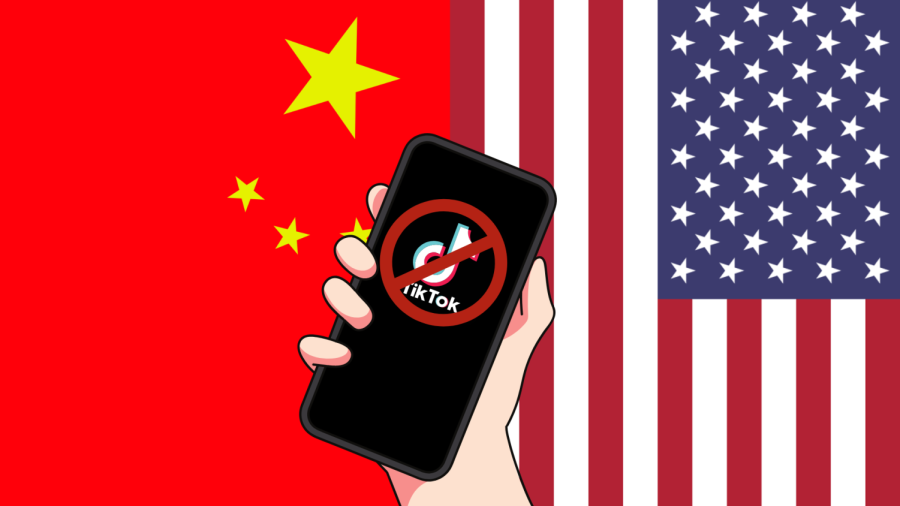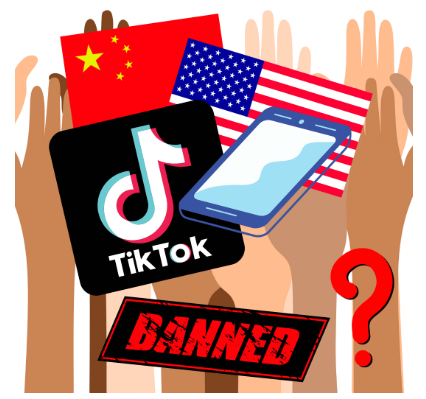“TikTok Bill” heard by Congress
April 25, 2023
A bill introduced on March 7th introduces the possibility of a ban on TikTok, the popular social media app.
‘TikTok Ban Bill’ would do more than ban TikTok
The “RESTRICT Act” (S.686) is a bill that was introduced to the United States Senate on March 7, 2023 and has yet to proceed further into the legislation process. While some have called this bill the “TikTok Ban Bill,” it includes more than simply the ban of TikTok.
This bill grants the Director of National Intelligence and the Secretary of Commerce the power to universally designate new “Foreign Adversaries” without Congress having any prior knowledge. It also allows a 15 day window to inform the president of this action and also requires a joint resolution of Congress to overturn the designation. Foreign Adversaries are defined as follows in SEC.2.DEFINITIONS of the bill: “The term ‘foreign adversary’- means any foreign government or regime, determined by the Secretary.”
While some may view this new action as a positive thing, others see potential problems.
The American Civil Liberties Union (ACLU) says,“The bill… would significantly expand the Executive Branch’s power to control what apps and technologies Americans can access, while limiting Americans’ ability to challenge those actions in court. It would also impose civil and criminal penalties for violating bans imposed pursuant to legislation, which could be used against people attempting to evade a TikTok ban.” The penalties for civil violations include fines up to $250,000 per violation and fines up to $1,000,000 and imprisonment for up to 20 years for criminal ones.
Because of these penalties, many argue that this bill would undermine the freedom of expression in the United States. S.686 could directly restrict a users’ ability to speak and receive information. Many U.S. citizens, specifically teens, use TikTok as a place to share and find information across a broad variety of topics. The Supreme Court has recognized that the First Amendment not only protects the right of free speech, but also the right to obtain information, including information from abroad.
Although there are other online services that may remain available, banning TikTok would prevent people from spreading and receiving information from an important and distinct internet tool. “Just as the Supreme Court has recognized that bans on yard signs, pamphlets, or live entertainment are not permitted under the First Amendment simply because other means of expression remain available, a ban in TikTok suppresses a unique medium of expression and suppresses too much speech,” says the Center For Democracy & Technology (CDT).
TikTok being banned in the US would also be something called a “prior restraint” on speech, which is a limit imposed on speech before it happens. The CDT says, “The Supreme Court has long recognized that the chief purpose of the First Amendment is to prohibit prior restraints and that prior restraints can be justified only by the most extraordinary circumstances.”
In the past, the Supreme Court has denied justifications based on national security interests.
The main reason this bill is even being implemented is because of the government’s concerns over the Chinese government using TikTok to gather U.S. information. However, if this was the case, and the Chinese government, or any foreign government was using social media in this way, the First Amendment would forbid the government from banning the service because the viewpoints expressed on it don’t align with that of the government.
If this bill were to become law, the next step would be to pass Senate.

Addie Wilkin is a junior and second year journalism staff member. Outside of school her hobbies include 4-H, video games and hanging out with her friends....
Tiktok ban possible
TikTok, the popular video app used among all ages, is one of the most popular entertainment apps in the US, ranking number one for most downloads. The short videos posted on the app offer new information, dance ideas, music, humor, and much more, all depending on what you are interested in. TikTok also serves as a marketing website because of its ability to innovate creative ads that might just pop up and grab someone’s attention. Despite its popularity, some people are concerned it’s a potential threat against our country and the Biden administration, the White House, and senator Josh Hawley are proposing either the owners sell their stakes or the potential ban of the app in the US.
In March the Biden administration threatened to ban TikTok because of the concern that TikTok may be collecting personal information. According to Hawley on his website he says, “TikTok poses a threat to all Americans who have the app on their devices. It opens the door for the Chinese Communist Party to access Americans’ personal information, keystrokes, and location through aggressive data harvesting. Banning it on government devices was a step in the right direction, but now is the time to ban it nationwide to protect the American people.” According to him and the administration they have considered this as our best option.
TikTok, unlike other websites, has third party tracking that, according to Tech The Lead, “ …allows third-party trackers on its platform – so that means that there’s no telling where your TikTok data goes. Those third-party trackers can also track your activity even after you close TikTok.”
The main reason people are so concerned about where this data is going is that TikTok is owned by a Chinese company, ByteDance Ltd. People are worried that their personal information has been stolen or stored and it’s said according to Pew Research, “more than twice as many Americans support the U.S. government banning TikTok as oppose it.” They also say that more older Americans support the banning rather than younger, and that in general more people are for rather than against it.
However the ones that oppose are people like Baedri Nichole. CBS News says that she’s the founder of a bakery in Columbus Ohio and says that TikTok has helped her so she questions why congress wants to ban the app.
“‘It’s taught me how to do e-commerce, how to get into shipping and more than anything,” says Nichole. “I also use it to find my next customer. Prior to getting on TikTok, we were struggling even to turn a profit.’” As some don’t like the idea, realistically it’s fair because they can get hurt from it.
If the ban were to go into effect, other apps might take its place. One such app, quite similar to TikTok itself, is Triller.
According to We’ve got this covered, “Launched in 2015 as a video editing app, Triller is probably best placed to usurp TikTok’s position if it’s banned in the U.S. Triller allows users to create music videos, lip-sync videos and skits, with the opportunity to add background music, too. The way it differentiates itself from competitors like TikTok is its AI tool that automatically stitches video clips together, so users can focus on content instead of editing.”
TikTok and some other popular social networking sites use what’s called a closed-garden system. This means that creators only gain about 1 percent of their money, while Triller uses an open-garden system which is said to give creators 70 percent of their money which will cause users to sway that way. As it seems to be said that Triller will be easier to use among editing it’s also said that Triller will grab influencers attention because of its ability to put light back on to the potentially lost from TikTok.
As Montana has become the first state to approve a bill that would ban TikTok over the possibility that the Chinese government could request Americans’ data from the wildly popular video-streaming app.” The ban of the app in Montana is supposed to prohibit downloads of the app and or charge for the app if advertised, however this does not go for people who already use the app. As the government does its job to protect, it’s truly up to the people who use the app to either decide to stop using it or just delete it.

Gretchen Roaden is a senior and this is her first year in journalism! Gretchen loves watching movies, her favorite being The Bee Movie, so much so that...

